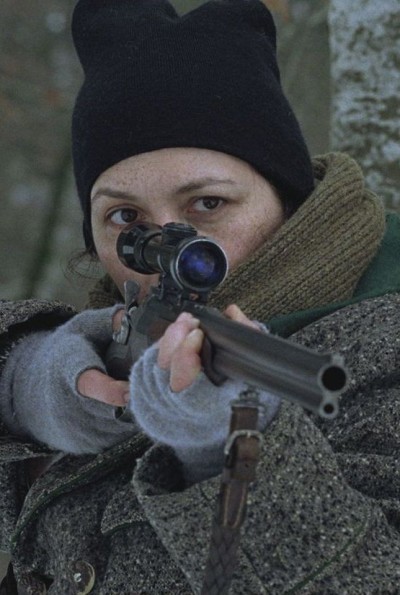★★½
“The Girl with the Dragon Tattoo (Lifetime TVM version)”
 Holly (Avgeropoulos, best known for her role in post-apocalypse series The 100) is a high-school hacker in Philadelphia, convinced against her better judgment to attend a college party with her best friend. These doubts prove amply justified, as her friend ends up dead, after being dosed with drugs by slimy sex offender Spencer Oliphant (Van Dien), and Holly is blamed, with no-one believing in Oliphant’s existence – it’s doesn’t help that the two girls were on probation for an earlier pharmaceutical incident. On her way to jail, other prisoners in Holly’s van are busted out, and Holly also goes on the lam with the help of Dan (Rindress-Kay), intent on tracking down Oliphant and exposing him as the real culprit. Hot on her trail is Detective Cameron Langford (Cox), who wants Holly to come in before she makes things worse for herself, but has to deal with problems of her own, because the dead girl was the daughter of a major contributor to the mayor’s campaign.
Holly (Avgeropoulos, best known for her role in post-apocalypse series The 100) is a high-school hacker in Philadelphia, convinced against her better judgment to attend a college party with her best friend. These doubts prove amply justified, as her friend ends up dead, after being dosed with drugs by slimy sex offender Spencer Oliphant (Van Dien), and Holly is blamed, with no-one believing in Oliphant’s existence – it’s doesn’t help that the two girls were on probation for an earlier pharmaceutical incident. On her way to jail, other prisoners in Holly’s van are busted out, and Holly also goes on the lam with the help of Dan (Rindress-Kay), intent on tracking down Oliphant and exposing him as the real culprit. Hot on her trail is Detective Cameron Langford (Cox), who wants Holly to come in before she makes things worse for herself, but has to deal with problems of her own, because the dead girl was the daughter of a major contributor to the mayor’s campaign.
Holly makes for an interesting character, even though Avgeropoulos is way too old to be playing a teenager, being the best part of a decade older than the alleged high-school student. Mind you, with Van Dien drooling all over her, that’s probably for the best. While the film does specifically indicate she has no parents, and is, in fact, also taking care of her sick grandmother, there isn’t the necessary intensity to convince me that Holly could survive on her own. It’d also have been cool to have had her make more use of her technological skills to track down Olyphant, perhaps destroying his life in the same way that he destroyed hers, toying with him before eventually handing him over to the police. That’s the way I’d have gone, had I been writing this: however, it would certainly not have been suitable for screening as a Lifetime TVM. Given this, it’s no spoiler to reveal that the film ends with hugs all round, lessons learned, and a cleaned-up version of Holly, no longer sporting dyed hair and piercings, serving birthday cake to her granny.
It’s a painfully obvious ending, and there enough other mis-steps on the way there to have me rolling my eyes on occasion. Holly’s breakout from custody is far too convenient, and I can’t say I would expect the police to take seriously a fugitive, calling after having broken into someone else’s house, who claims the house-owner is the real culprit and, look, I found drugs they were hiding. But if the storyline is, more or less, pants, the performances aren’t bad, with Cox giving a nice performance as a single mom having to juggle a harassing husband, and troublesome son – though, with this being Lifetime, his delinquency extends no further than being caught skateboarding on private property. Van Dien is also suitably sleazy [Man, it doesn’t seems so long ago he was playing high-school students himself; must watch Starship Troopers again some time.] and you certainly find yourself rooting for him to be taken down. For what this is, it’s okay: however, it’s another case where the makers could have aimed a good deal higher.
Dir: Jim Donovan
Star: Marie Avgeropoulos, Christina Cox, Casper Van Dien, Daniel Rindress-Kay







 The introduction tries to make it seem as if this could take place at any point in history, but there’s not much effort put into maintaining the illusion. The guns and overall setting – best described as “distressed warehouse” – puts this firmly into the post-apocalypse genre, though it’s very much at the bargain basement end of the spectrum. The heroine (adult actress Asuka) stumbles across naively innocent Anne (Akiyama), being pawed by some bad guys after straying into the danger zone to pick flowers; clearly a kinder, gentler apocalypse. After punching them out, assisted by remarkable reactions and her metal exo-skeleton, Anne is escorted back to her
The introduction tries to make it seem as if this could take place at any point in history, but there’s not much effort put into maintaining the illusion. The guns and overall setting – best described as “distressed warehouse” – puts this firmly into the post-apocalypse genre, though it’s very much at the bargain basement end of the spectrum. The heroine (adult actress Asuka) stumbles across naively innocent Anne (Akiyama), being pawed by some bad guys after straying into the danger zone to pick flowers; clearly a kinder, gentler apocalypse. After punching them out, assisted by remarkable reactions and her metal exo-skeleton, Anne is escorted back to her  This is a very different kind of GWG film: indeed, it could almost be called an inaction heroine movie. It starts from a very simple presence. A woman (Gedeck) wakes up in a cabin in the Austrian Alps. When she tried to head to a nearby village, the path is blocked by an unseen, impenetrable barrier that has sprung up overnight, and now defines the boundary of her world. Everyone outside is dead. What do you do? How do you survive, both short- and long-term? Could you handle the loneliness? Can you retain your humanity, when you are, apparently, the only human being left?
This is a very different kind of GWG film: indeed, it could almost be called an inaction heroine movie. It starts from a very simple presence. A woman (Gedeck) wakes up in a cabin in the Austrian Alps. When she tried to head to a nearby village, the path is blocked by an unseen, impenetrable barrier that has sprung up overnight, and now defines the boundary of her world. Everyone outside is dead. What do you do? How do you survive, both short- and long-term? Could you handle the loneliness? Can you retain your humanity, when you are, apparently, the only human being left? There’s something almost theatrical about this, because virtually the entire film takes place in a single location, the downscale home of Lorna (Gershon), who has just knocked her husband Dale (Kilmer) out with a frying-pan, after discovering he was apparently involved in a bank robbery which netted $100,000. She has now called over her best friend, local barmaid Tiny (Giddish), to try and decide what to do next, with the first step being to find the loot, which Lorna is convinced Dale has hidden somewhere in their home. However, the local sheriff (Liotta) is also sniffing around, being fully aware of Dale’s fondness for armed robbery in his younger days. It’s not long before the dead bodies are piling up, requiring alternative uses to be found for the turkey carver and industrial-strength blender. And that’s just the start of the unpleasantness.
There’s something almost theatrical about this, because virtually the entire film takes place in a single location, the downscale home of Lorna (Gershon), who has just knocked her husband Dale (Kilmer) out with a frying-pan, after discovering he was apparently involved in a bank robbery which netted $100,000. She has now called over her best friend, local barmaid Tiny (Giddish), to try and decide what to do next, with the first step being to find the loot, which Lorna is convinced Dale has hidden somewhere in their home. However, the local sheriff (Liotta) is also sniffing around, being fully aware of Dale’s fondness for armed robbery in his younger days. It’s not long before the dead bodies are piling up, requiring alternative uses to be found for the turkey carver and industrial-strength blender. And that’s just the start of the unpleasantness. For years, an assassin known as “Jackal”, has eluded all efforts at capture, taking out targets before vanishing without trace. However, it seems that retirement is close, when a note is found, apparently left by the killer. This indicates that they are tired of the chase, and will be in a town’s low-rent hotel, waiting for the police. The cop (Han) who has been hunting Jackal is, understandably, wary and suspects a trick, but sets up a stakeout in the hotel to see what unfolds. However, already in one of the rooms there is K-Pop superstar Choi Hyun (Kim)., who had been hoping to hide out for a bit of peace and quite, only to be kidnapped by a rookie killer (Song), hired by his jilted lover. She’s apparently not very good at her job, especially after Choi convinces her he isn’t actually the star, but a celebrity lookalike. Meanwhile, a local cop (Oh) has been drafted in to help with the stakeout, and the hotel staff are proving rather less than helpful, treating the stakeout as a bonus cash-cow to be milked, rather than a chance to help the authorities.
For years, an assassin known as “Jackal”, has eluded all efforts at capture, taking out targets before vanishing without trace. However, it seems that retirement is close, when a note is found, apparently left by the killer. This indicates that they are tired of the chase, and will be in a town’s low-rent hotel, waiting for the police. The cop (Han) who has been hunting Jackal is, understandably, wary and suspects a trick, but sets up a stakeout in the hotel to see what unfolds. However, already in one of the rooms there is K-Pop superstar Choi Hyun (Kim)., who had been hoping to hide out for a bit of peace and quite, only to be kidnapped by a rookie killer (Song), hired by his jilted lover. She’s apparently not very good at her job, especially after Choi convinces her he isn’t actually the star, but a celebrity lookalike. Meanwhile, a local cop (Oh) has been drafted in to help with the stakeout, and the hotel staff are proving rather less than helpful, treating the stakeout as a bonus cash-cow to be milked, rather than a chance to help the authorities. It’s 1993, and the peace process in Northern Ireland is cautiously inching forward – though there are some who prefer a more robust method of rebellion, shall we say. Among them is Collette McVeigh (Riseborough) whose little brother was killed by the British Army when she was 12. Along with her brothers Gerry (Gillen, whom you’ll know as Littlefinger from Game of Thrones) and Connor, she is part of the armed struggle, until a mission to plant a bomb in London leads to her capture. MI5 officer Mac (Owen) gives her a stark choice: face a long stretch in prison, separated from her children, or become an informer on her own family. Collette chooses the later, perhaps influenced by Mac showing her it was an IRA sniper who killed her brother. But it soon becomes clear more is at play, with Mac’s boss (Anderson) apparently intent on sacrificing Collette, in order to protect another, more valuable asset.
It’s 1993, and the peace process in Northern Ireland is cautiously inching forward – though there are some who prefer a more robust method of rebellion, shall we say. Among them is Collette McVeigh (Riseborough) whose little brother was killed by the British Army when she was 12. Along with her brothers Gerry (Gillen, whom you’ll know as Littlefinger from Game of Thrones) and Connor, she is part of the armed struggle, until a mission to plant a bomb in London leads to her capture. MI5 officer Mac (Owen) gives her a stark choice: face a long stretch in prison, separated from her children, or become an informer on her own family. Collette chooses the later, perhaps influenced by Mac showing her it was an IRA sniper who killed her brother. But it soon becomes clear more is at play, with Mac’s boss (Anderson) apparently intent on sacrificing Collette, in order to protect another, more valuable asset.
 Okay, I’m sure there are worse films on Netflix. Somewhere. But I haven’t yet found them/ Combining cheapjack production values with poor performances and woefully bad attempts at social commentary, the occasional decent fight sequence aren’t able to overcome the very significant negatives. The heroine is Noriko (Hellquist), who is raped by the Wall Street bigwig, Ronald Brooks, for whom she works – and then framed for his murder. She creates a secret identity, Shinobi Girl: as well as seeking to expose the real killer, she acts as the protector of the 99%, hunting down and dispatching the decadent uber-rich. They are led by Brooks’ widow (Fahey), and commit heinous crimes with no fear of legal reprisal, up to and including orgies of murder and cannibalism (!).
Okay, I’m sure there are worse films on Netflix. Somewhere. But I haven’t yet found them/ Combining cheapjack production values with poor performances and woefully bad attempts at social commentary, the occasional decent fight sequence aren’t able to overcome the very significant negatives. The heroine is Noriko (Hellquist), who is raped by the Wall Street bigwig, Ronald Brooks, for whom she works – and then framed for his murder. She creates a secret identity, Shinobi Girl: as well as seeking to expose the real killer, she acts as the protector of the 99%, hunting down and dispatching the decadent uber-rich. They are led by Brooks’ widow (Fahey), and commit heinous crimes with no fear of legal reprisal, up to and including orgies of murder and cannibalism (!).